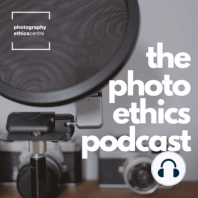2 min listen

Tara Pixley: On critical media production
Tara Pixley: On critical media production
ratings:
Length:
52 minutes
Released:
Oct 7, 2020
Format:
Podcast episode
Description
In this episode, we talk with Tara Pixley about the vital importance of taking a critical approach to media production. She unpacks our subconscious biases and the myth of objectivity to explain the importance of having different perspectives in the newsroom. She explains that both rights and responsibilities are central to her work in photojournalism. Finally, Tara reflects on personal experiences that have contributed to her understanding of what it means to be a responsible image-maker.What you’ll find inside:"I was beginning to realise that the ways we as journalists represent marginalised people … is very problematic and it's not holistic storytelling. It's not even necessary accurate all of the time. And it isn’t some kind of intentional choice made by the journalists … it really comes back to there being a lack of representation in the newsroom.” (2:45)“We have to start addressing who we are, what we, as individuals, bring to our media production, because everyone else is going to tell you that you have to take yourself out of it, that you’re objective. … No one can be objective. And, in fact, if we’re adhering to this ideal of objectivity, it allows us to do all manner of heinous things because we’re not looking very critically at what we’re actually producing.” (8:40)“Any time we’re rushing away to go do something as a journalist, we’re assuming that what’s happening here doesn’t matter and that what’s happening out there is something that we have a right to.” (14:50)“Across hundreds of thousands of newsrooms, it’s the same kind of people seeing the same way, thinking the same way - and it’s not that that way is wrong, there is nothing wrong with the way that they think or see - it just isn’t complete, it isn’t diverse, it is not encompassing the whole of human experience, and it shows.” (21:00)“Our goal as photojournalists is to inspire that empathetic response … You can’t do that with a blurred face. You can’t do that when you see an image of people, you know, marching down the street, but they’re all just blobs. That photo becomes irrelevant…. This demand from audiences to do that indicates that they don’t really understand what photojournalists are supposed to be doing.” (34:10)“I just happen to be of the opinion that I can both hold on to my first amendment rights and minimise harm as I’m utilising those rights. I believe that I have rights and responsibilities to my public.” (39:00)“We need to stay with the trouble, we need to keep having those uncomfortable conversations and keep reckoning with our own relationship to images and what it means to make a photo." (50:00)What does photo ethics mean to Tara?“Photography ethics to me means an opportunity for me to reckon with that space betwixt reasonability and rights. The ethics of photography is an opportunity for me to constantly reassess and reimagine what it is I’m doing as a photographer, as a photo editor, as a scholar of visual journalism. What ideas am I producing in the world and how am I treating people as I produce those ideas?” (46:00)Links:“Why We Need More Visual Journalists and Editors of Color”Authority Collective
Released:
Oct 7, 2020
Format:
Podcast episode
Titles in the series (49)
Trailer: Welcome to The Photo Ethics Podcast: Find out what we mean when we say 'photo ethics' by The Photo Ethics Podcast